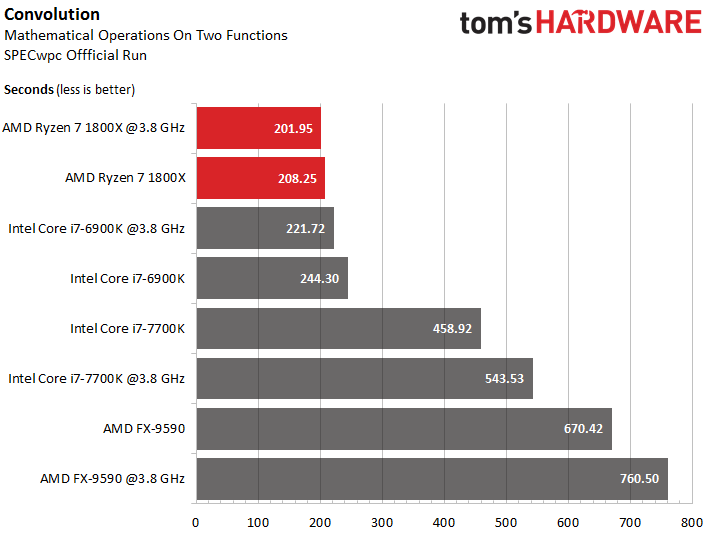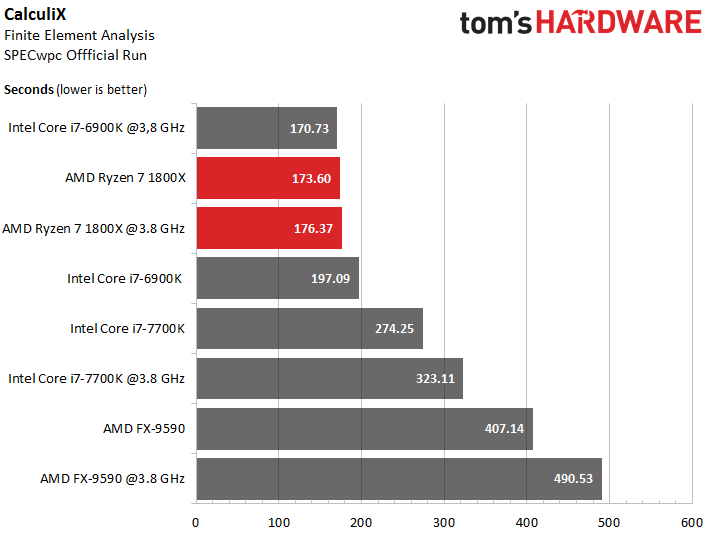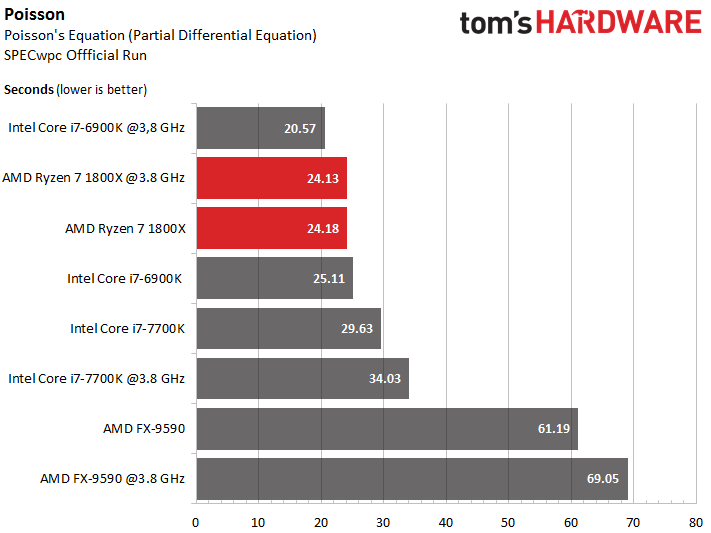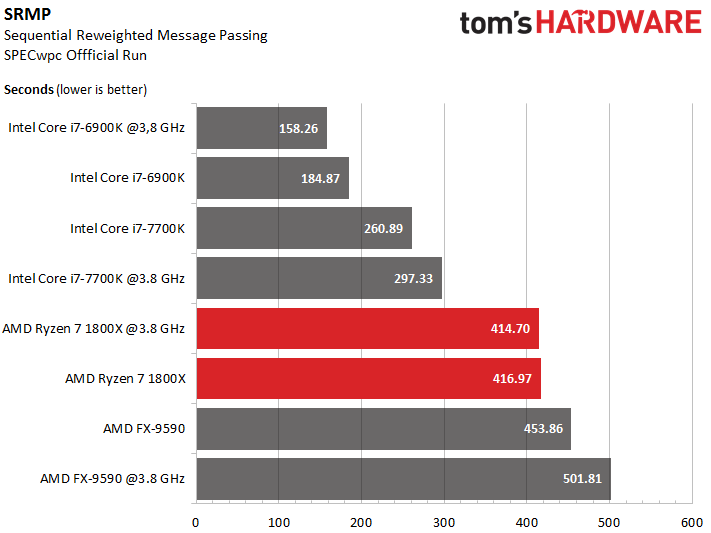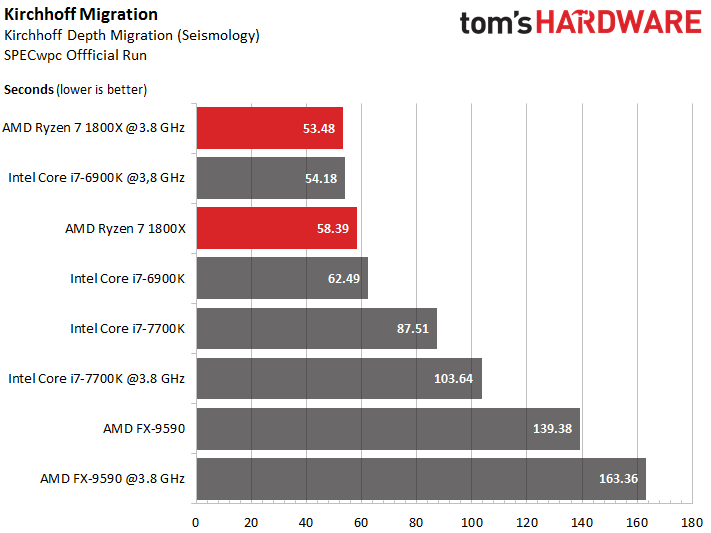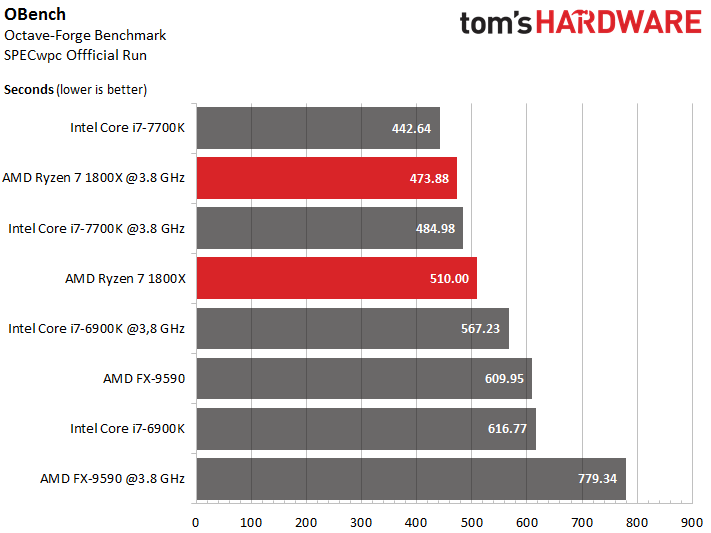AMD Ryzen 7 1800X CPU Review
Why you can trust Tom's Hardware
Results: Scientific & Engineering Computations And HPC
We’re using the SPECwpc benchmark suite, since it provides a good variety of workstation tasks that use very different types of mathematical computations. These are both highly parallelized and also make heavy use of memory bandwidth, cache, and latencies.
The pre-Euler3D CFD (Computational Fluid Dynamics Benchmark) test did work, but the rest of Rodinia’s benchmarks (i.e., Accelerating Compute-Intensive Applications) didn’t. We’re still showing all of the results below, since the remaining CPU’s results might still be of interest.
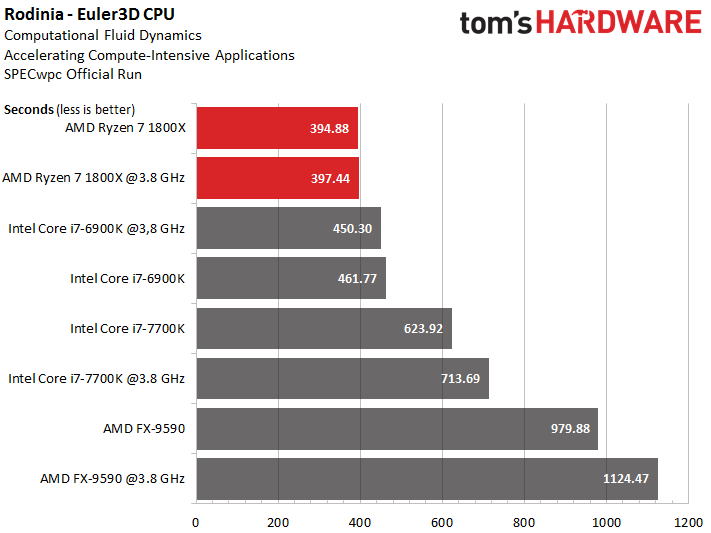
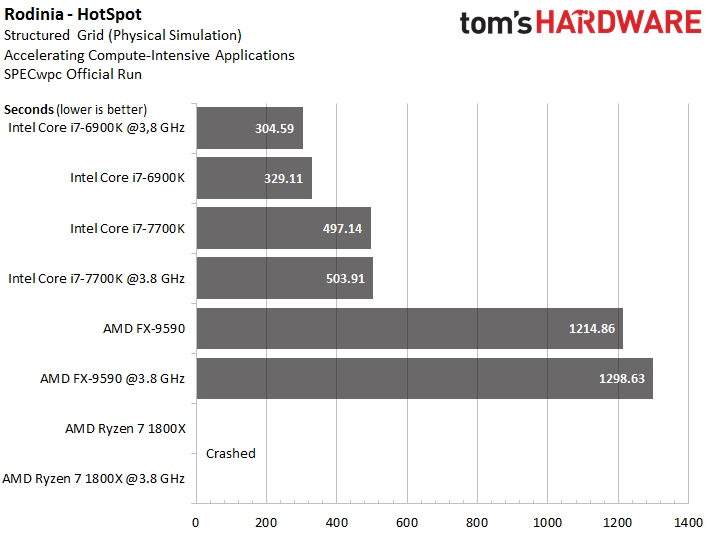
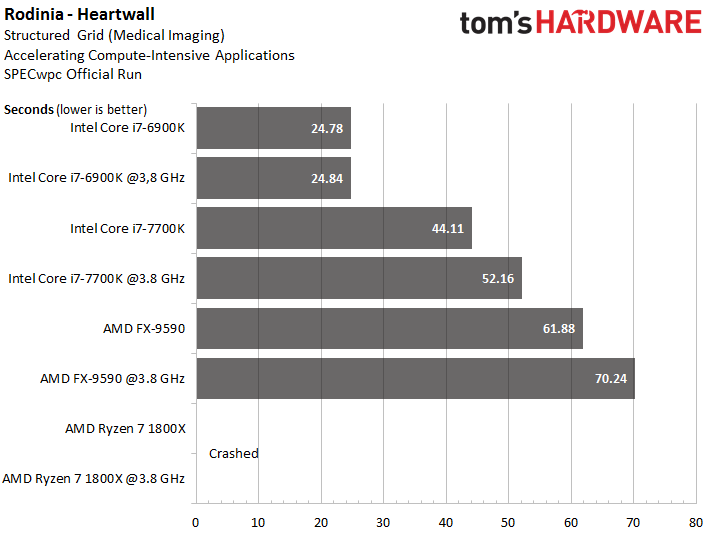
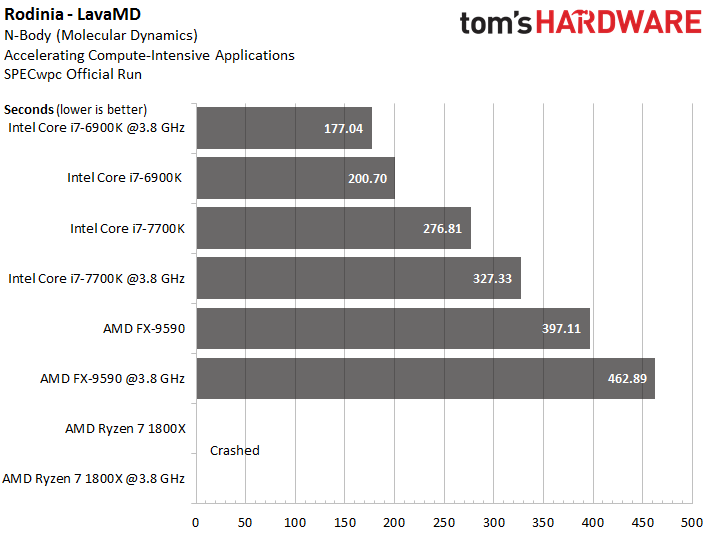
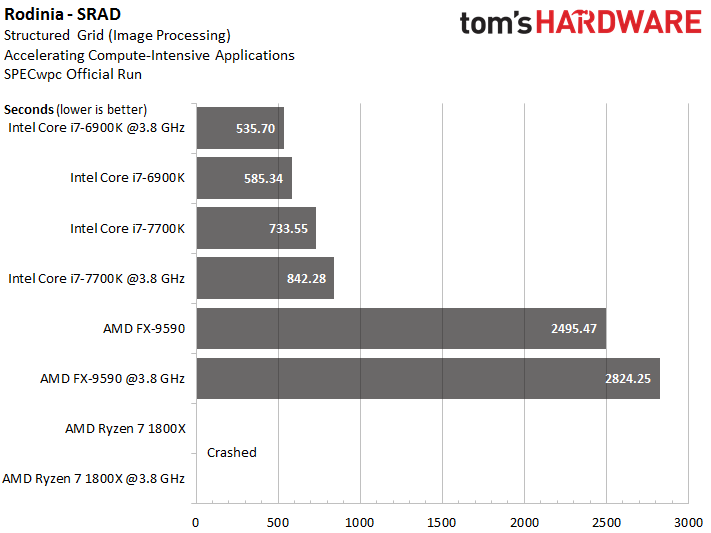





LAMMPS stands for Large-scale Atomic/Molecular Massively Parallel Simulator, and it didn’t just run flawlessly, but also really showed off Ryzen’s capabilities. In the resulting head-to-head race, AMD got there first more often than not.
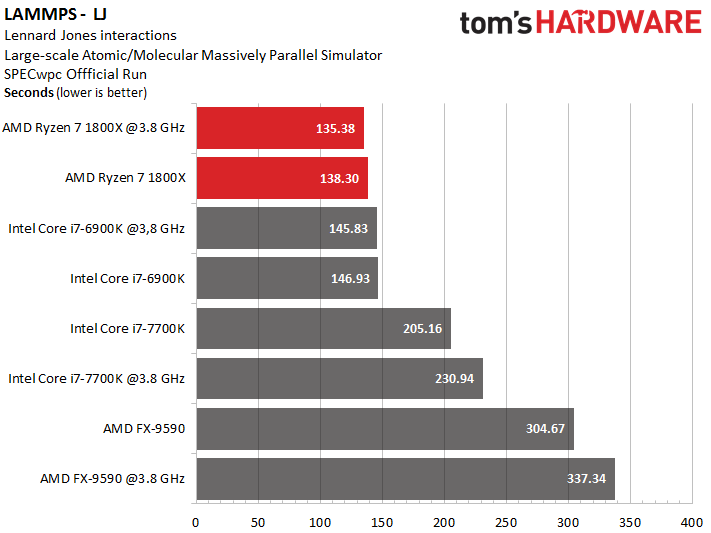
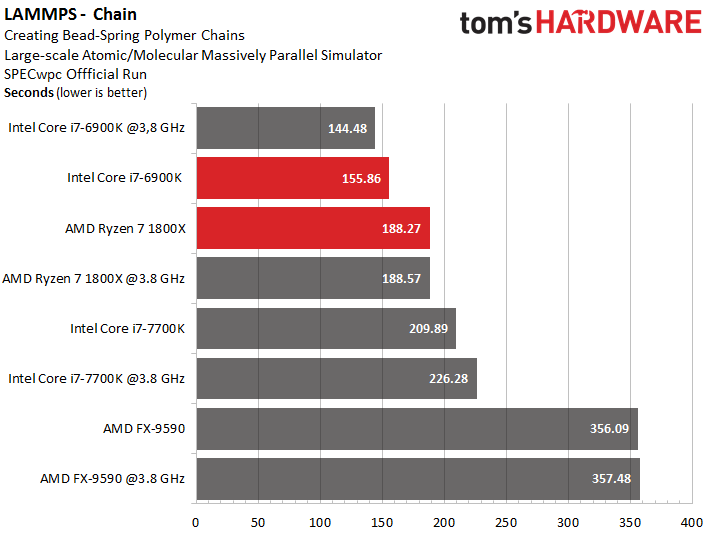
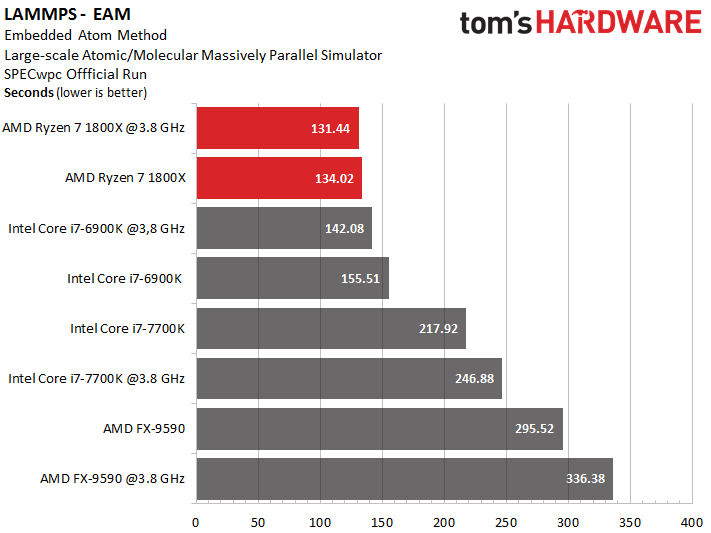
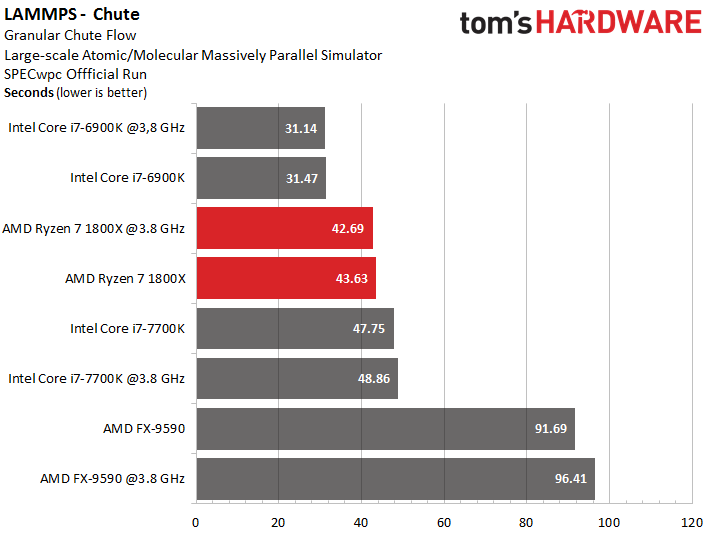
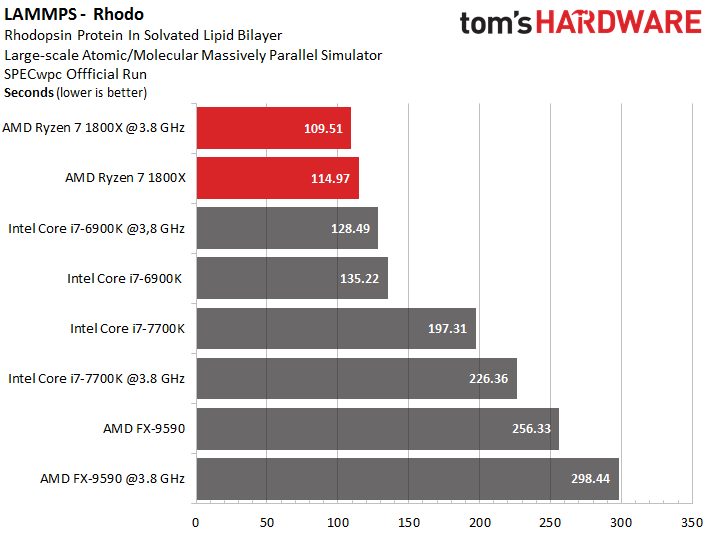





NAMD is a benchmark for high-performance simulation of large biomolecular systems. All individual tests went Ryzen 7 1800X’s way.






The Fastest Fourier Transform in the West, or FFTW, is a popular open-source solution to compute one-, two- and three-dimensional DFTs (Discrete Fourier Transforms). The C library makes heavy use of single-precision AVX these days, which proves to be a terrible thing for the Ryzen 7 1800X.



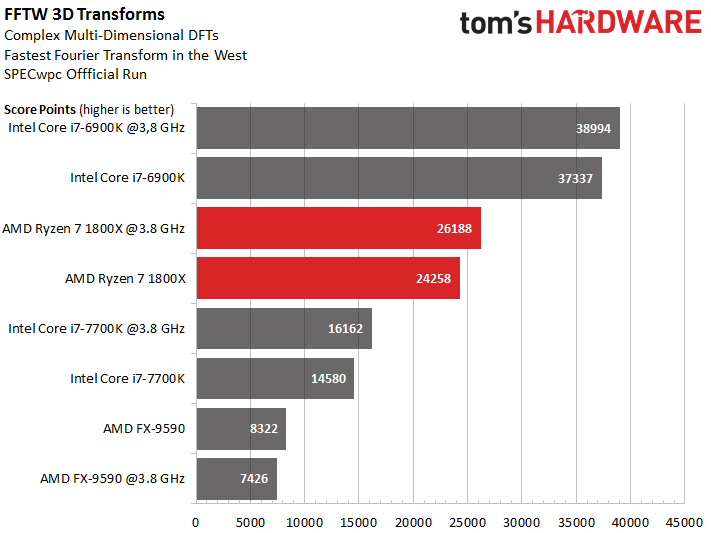
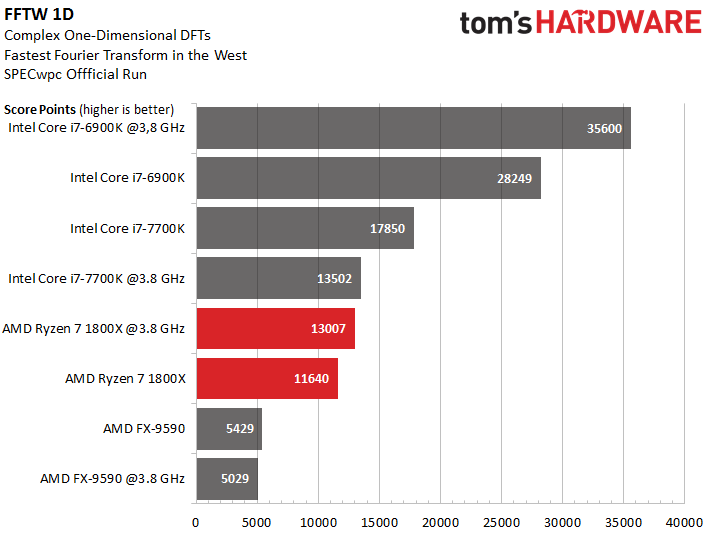
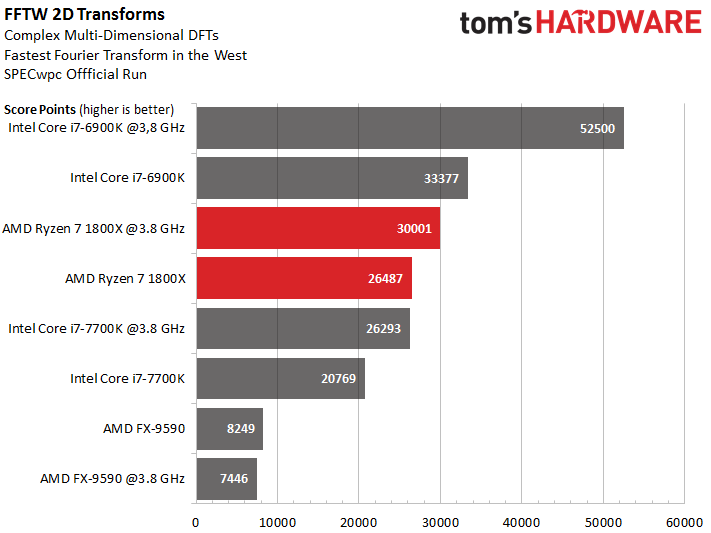
Convolution is a benchmark for an area of functional analysis. Convolution stands for a mathematical operation on two functions (i.e., f and g) that produces a third function.
The CalculiX benchmark is based on a three-dimensional structural finite element program.
Get Tom's Hardware's best news and in-depth reviews, straight to your inbox.
Poisson's Equation is a partial differential equation that allows the modeling of the number of incidences that occur at a constant medium rate independent of each other within a fixed time interval or area. It doesn’t prove to be a problem for AMD’s Ryzen 7 1800X, but the older AMD FX-9590 doesn’t fare well.
Sequential Reweighted Message Passing, or SRMP for short, is an algorithm used to solve discrete energy minimization problems. AMD’s Ryzen 7 1800X runs into trouble, which might be due to the specific benchmark application. It uses a total of eight threads.
The earth’s underground structure can be ascertained based on seismic processing. One of the four basic steps to do so is the Kirchhoff Migration, which is used to build a graphical representation out of the available data. AMD’s Ryzen 7 1800X does well with it.
GNU Octave is a scientific programming language. Octave Forge is a toolbox that’s an important part of it, since it allows additional functions to be added and the application’s functionality to be extended. AMD’s Ryzen 7 1800X does a solid job, but we do have to note that not all of the functions worked without problems and that we had to skip one chart graph altogether.
Bottom Line
Unfortunately, we just didn’t have time to try to find possible solutions to the problems that occurred with GNU Octave and some of the other benchmarks. Otherwise, we would have searched for the root of the problems or tested the software using a different operating system. Alas, two days just aren’t enough time to perform a comprehensive CPU test.
This is even more regrettable in light of the fact that AMD’s Ryzen generally does well with these types of tasks. It would have been nice to know the reasons behind the few times when it didn’t. Overall, we’re left with the impression that AMD’s boiled down a server CPU to the desktop level. This doesn’t have to be a bad thing, though, and it certainly makes us excited for Naples.
Current page: Results: Scientific & Engineering Computations And HPC
Prev Page Results: Workstation Next Page Results: Power Consumption And Temperatures
Paul Alcorn is the Editor-in-Chief for Tom's Hardware US. He also writes news and reviews on CPUs, storage, and enterprise hardware.
-
vrumor Well, at the very least, it is competition. Competition drives innovation and lower costs. Well done AMD.Reply -
kiniku Why did I feel AMD was hiding something? Understandably the "gamer market" is comparatively small. But couldn't AMD have designed a CPU that worked well in gaming/desktops and in data centers? Disappointing.Reply
(But I have a 5820K. The best Ryzen in the world would not have had me switch anyway.) -
xryanx123 Bias review as always. Most of your information is obviously screwed up. How do you get 4.0ghz at 1.45v. When that's not even an overclock for the chip (not really at least compared to stock) yet you're already pushing 1.45v? You're tailoring your articles for the uneducated. Duck off tomsReply -
captaincharisma in the end the best anyone can hope from AMD is that it spooked intel enough to lower its pricesReply -
ssdpro In a hurry to compare various site's gaming results, it appears differing sites are finding the same thing: gaming performance is acceptable but below 4c/8t Intel offerings. If you spend your day encoding or multi-thread benching this is a monster bargain.Reply
With the good and bad, I think we can all agree the good here is competition. There is some now. -
Pompompaihn All along AMD was claiming to equal/beat Broadwell-E in comparative tasks at half the price, and from another review that included Broadwell-E, it's done that. I don't recall ANY AMD press saying it was going to beat the 7700K in straight up gaming. So, target set, and hit. That's a win in my book. But now, need to see what they can do with the smaller core count chips and if they can scale frequency to be competitive in the gaming sector.Reply -
Dionisiatis Maybe i missed it but i would love to see a perf/dollar ratio comparison. Im sure Ryzen would occupy the top position, and it would also make it clear that AMD achieved extraordinary results in bringing such high performance to the average consumer that cant 700+ dollars for a CPU.Reply -
jackspeed @Dionisiatis the 7700K is cheaper then the 1800X so for gamers it currently is the best CPU. now games have yet to optimize for the new AMD architecture, so maybe soon it will be a different story.Reply -
Aspiring techie Your "Heating up AMD Ryzen" video on the Power and Temperatures tab is still private. I can't watch it.Reply -
Fails in gaming, and for multitasking stuff i got Xeon 14/28 who is doing all that encoding and other stuff for $300 on eBay.Reply
In my opinion AMD failed and they really pulled BS by fooling people into pre ordering but it turns out that in gaming sucks..
